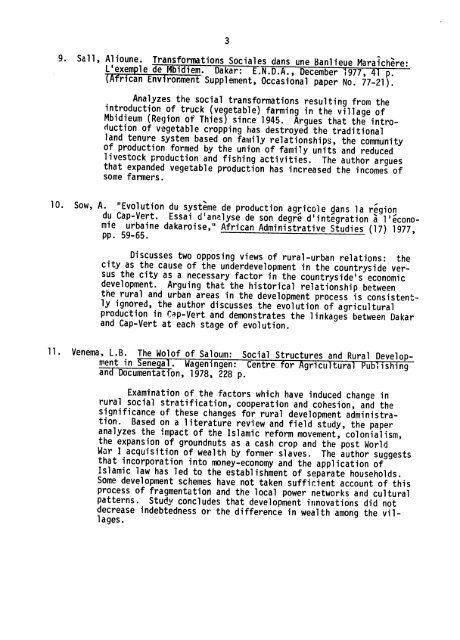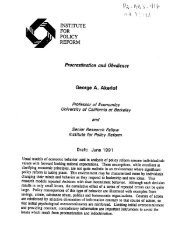SO 0\C)V'lQ " -- - usaid/ofda
SO 0\C)V'lQ " -- - usaid/ofda
SO 0\C)V'lQ " -- - usaid/ofda
Create successful ePaper yourself
Turn your PDF publications into a flip-book with our unique Google optimized e-Paper software.
3<br />
9. Sall, Alioune. Transformations Sociales dans une Banlieue Maraichere:<br />
L'exemple de Mbidiem. Dakar: E.N.D.A., December 1977, 41 p.<br />
(African Environment Supplement, Occasional paper No. 77-21).<br />
Analyzes the social transformations resulting from the<br />
introduction of truck (vegetable) farming in the village of<br />
Mbidieum (Region of Thies) since 1945. Argues that the introduction<br />
of vegetable cropping has destroyed the traditional<br />
land tenure system based on family relationships, the community<br />
of production formed by the union of family units and reduced<br />
livestock production and fishing activities. The author argues<br />
that expanded vegetable production has increased the incomes of<br />
some farmers.<br />
10. Sow, A. "Evolution du systeme de production agricole dans la r~gion<br />
du Cap-Vert. Essai d'analyse de son degre d'integration a l'economie<br />
urbaine dakaroise," African Administrative Studies (17) 1977,<br />
pp. 59-65.<br />
Discusses two opposing views of rural-urban relations: the<br />
city as the cause of the underdevelopment in the countryside versus<br />
the city as a necessary factor in the countryside's economic<br />
development. Arguing that the historical relationship between<br />
the rural and urban areas in the development process is consistently<br />
ignored, the author discusses the evolution of agricultural<br />
production in Cap-Vert and demonstrates the linkages between Dakar<br />
and Cap-Vert at each stage of evolution.<br />
11. Venema, L.B. The Wolof of Saloum: Social Structures and Rural Development<br />
in Senegal. Wageningen: Centre for Agricultural Publishing<br />
and Documentation, 1978, 228 p.<br />
Examination of the factors which have induced change in<br />
rural social stratification, cooperation and cohesion, and the<br />
significance of these changes for rural development administration.<br />
Based on a literature review and field study, the paper<br />
analyzes the impact of the Islamic reform movement, colonialism,<br />
the expansion of groundnuts as a cash crop and the post World<br />
War I acquisition of wealth by former slaves. The author suggests<br />
that incorporation into money-economy and the application of<br />
Islamic law has led to the establishment of separate households.<br />
Some development schemes have not taken sufficient account of this<br />
process of fragmentation and the local power networks and cultural<br />
patterns. Study concludes that development innovations did not<br />
decrease indebtedness or the difference in wealth among the villages.

















